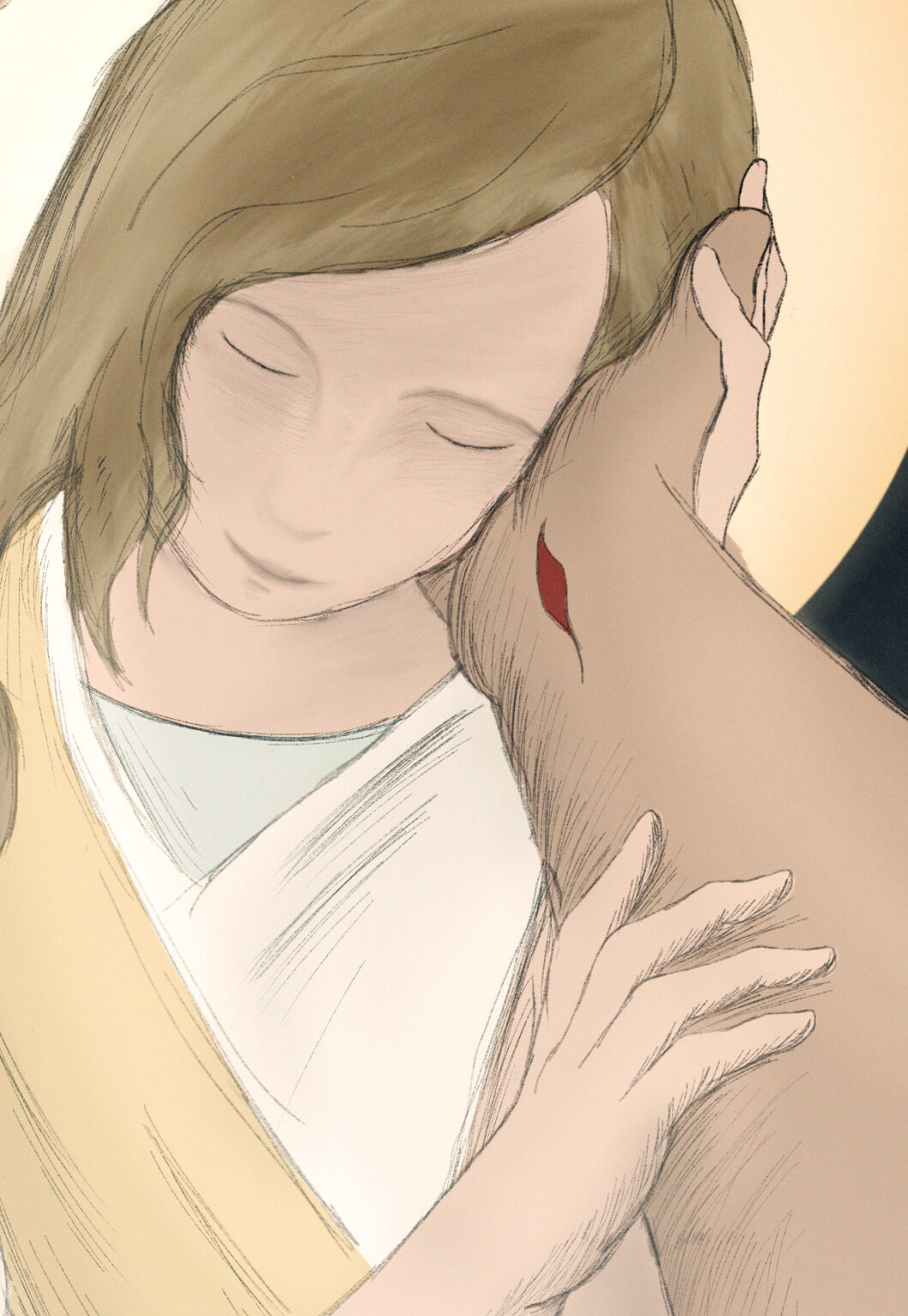
“Do not fear, only believe.”
– Mark 5:36
Jarius’ daughter had just died. If you’ve ever lost someone close to you, you know the sinking, hollow, chilling mixture of grief and terror that was spreading through Jarius mind and heart when he heard that his twelve year old girl was gone….and into that darkness, Jesus speaks these words: “Do not fear, only believe.” Though much could be said, I just have two questions that I want to address: first, what is Jarius supposed to believe and second, what is the dichotomy between fear and belief?
“Only Believe” – In What?
First, in what is Jarius to “only believe”? This is an important question because often times the culture around us will say something very similar to what Jesus said. They will says things like: “just believe in yourself, you can do it,” or, “believe that this will turn out all right,” or “believe that everything happens for a purpose,” or again, “believe in your dreams!” Etc. etc. This is not what Jesus was saying. “Belief” in and of itself is worthless, what the belief is in makes all the difference. Just as a grappling hook is only as sturdy as the anchor to which it holds, so too belief is only as valuable as the object in which it trusts. So, again, what is Jesus telling Jarius to “only believe” in?
Well, in context it seems that he is to believe that Jesus is able and willing to heal his daughter, even at this late and hopeless stage. It would not be presumptuous for Jarius to believe that Jesus would do this because he’s already asked Jesus for help and the Lord has agreed and come with him (5:23-24). Jesus’ actions have–for all intents and purposes–promised that He would heal Jarius’ daughter. Because of this, when Jesus tells Jarius to “only believe,” He is not telling him to believe in a generic silver lining or generic plan for good, rather He is calling him to believe in the ability of Christ to do what He set out to do, to do what He has bound Himself to do. Essentially, Jesus tells Jarius to “only believe” in the “promise” of Jesus’ willingness to come and heal the girl (that is to say, in the trustworthiness and authority of Christ). We might generalize Jesus’ words Jarius as: “Do not fear, only believe that I will do what I have bound myself to do.” Or again, “Believe that I will do what I say I will do.”
So, how do we, in the 21st century, receive these words of Christ to Jarius? Are they true for us? In the midst of our trials and sorrows can we also hear the savior say to us, “Do not fear, only believe.” Yes. However….not in exactly the same way.
What “Only Believe” means for us
Jesus, as I said, had essentially given His word to Jarius that He would heal his daughter. So for Jarius to believe that his daughter would be well was the same thing as for Jarius to believe that Jesus would be faithful to His word. However–applied personally–Jesus has not given me any indication from His word that my daughter will not die, or that my bank account will not be hacked, or that He will not ordain cancer for me, or, if He does ordain cancer, He has given me no promise that He will heal it. I may be given the faith to pray for healing and–if so–wonderful. However, I don’t think this passage could be applied as “Do not fear your cancer, only believe that Jesus will heal it and He will!” Rather, in such a situation, I think that Christ’s words to Jarius might be appropriated by us more along these lines: “Do not fear your cancer, only believe the myriad and sweet promises of God in Christ for you….you are not destined for wrath, but for salvation (1 Thessalonians 5:9), this sickness will not and cannot separate you from His love (Romans 8:31-39), this sickness itself will turn out for your good (Romans 8:28), you will be given the grace to glorify God in your body even now (Philippians 1:19-21), Christ will give sufficient grace and show His power in your weakness (2 Corinthians 12:9-10)…etc. etc.” The “only believe” means: “Believe that I will do what I have said I will do.” And He has told us what He will do with infallible authority in His Word, and nowhere else.
Fear vs. Belief
Secondly, what is the dichotomy between fear and belief? Well, one simple thing to say is that the two seem to be mutually exclusive. The fear that Jesus warns against cannot exist at the same time as the belief that He commends, and vis versa. What is the fear? Well, again, in the context, the fear is that Jarius’ daughter will be lost to him for the rest of his life…that she is gone, that she is dead, that she is beyond healing. And as the antidote to these fears, Jesus tells Jarius to believe that He will do what He has set out to do, namely, to heal the girl. In other words, Jarius’ fear results from his belief that Jesus will not do what he set out to do.
Fear–in this situation–seems to be a sort of belief or faith. However, it is faith in a future where Jesus has failed to follow through on His words. In contradistinction, the belief that Jesus commands is faith in a future where Jesus has successfully followed through on His words. Both Fear and Belief seem to depend on a person’s attitude toward and expectation of Jesus. The difference between the two comes down to this question: “Will Jesus do what He said He would do or not? Will He be faithful to His word or not?”
How Do We “Only Believe”?
For Jarius, Jesus being “faithful to His word” meant healing his daughter…..it might not mean that for us. However, we have many, many words of Christ and of His Spirit that are designed to give us comfort and hope in the face of frightening and painful situations. Loss, uncertainty, doubt, chronic and acute pains, relational tensions, violations of mind, heart and body…all of these things may come, and in those moments “fear” means believing that Jesus will fail us, and “belief” means believing that He will come through for us according to His word.
Now, that last distinction (“according to His word”) is important. Jesus does not hold out the promise of certain healing or removal of pain or avoidance of tragedy or even of torture. None of those things are promised (in fact, often the opposite seems to be promised, Luke 21:16-18, John 16:33, 1 Peter 1:6, 2:20-21, Revelation 1:9). “Believing” that we will have a pain free, tragedy free, “health and wealth” life is NOT in view here. Our Lord and God Himself did not avoid these things, in fact, He descended into a darkness of suffering and agony infinitely beyond our imaginations…….but–and this is the glory–He was not defeated there. He bore the heaviest weight that sin and sorrow and suffering could create and He was crushed–but not destroyed. By Jesus’ death He draws intimately near to us in ALL of our sorrows, and by His resurrection He promises us that sorrow will not have the last word, that shame and suffering will not be the final notes, that our songs will end in joy and gladness will spring up from tear-watered soil.
So what does it mean for the Christian to not fear, but only believe? It means to cling to every promise of scripture as a blood bought truth and refuge for our souls. It means to trust that God will not fail us, that He will not prove to be deceptive, that He will not back out of His promises. And, ultimately I think it means to look to the cross and see all of our sorrows and sufferings–and sin that would have damned us to eternal sorrow–borne by Christ. And it means to look to the throne of heaven and to see the risen Christ seated their in glory and joy and victory and to know that HE WILL make good on every promise, that HE WILL come through for His people, that He will not allow us to be plucked from His hands, but will bring us–finally–into the presence of God’s own glory with great joy, and that a day will come–it is purchased by the blood of our God–a day will come when we will see all sadness and pain and confusion and cruelty and fear answered and overcome by Sovereign Love. So–whatever may be authored for our futures–may we not fear, but only believe.



